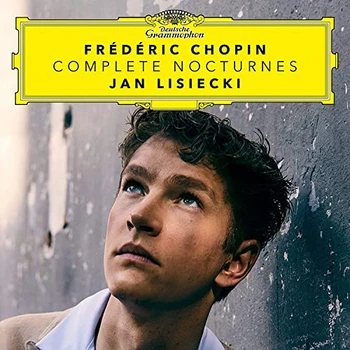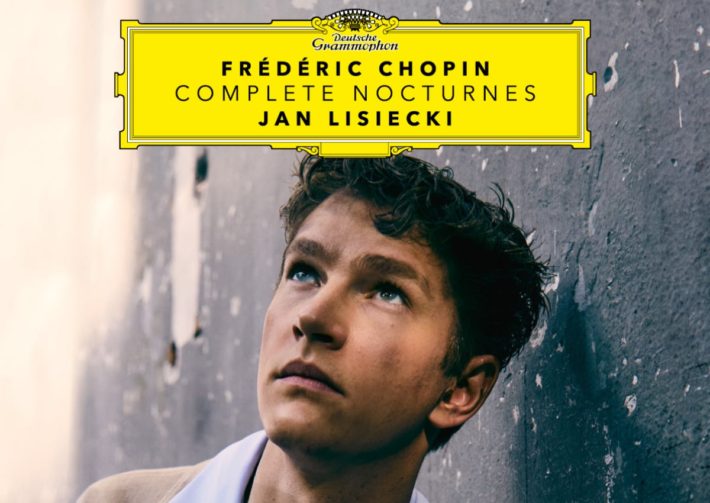In Jan Lisiecki’s own forward to his release of the Chopin Nocturnes, he includes a quotation from the composer: “Simplicity is the final achievement.” While these works collectively embrace many different personas, what Chopin may have been pointing to was the simple beauty that lies at the heart of each. And indeed, he communicates this to us – wistfully and sometimes passionately – but always directly.

The Op. 15 Nocturnes are among the composer’s earliest; however, they already show his proclivity for creating multidimensionality despite the straightforward relationships between textures and lines. The No. 1 F major (track 4), for instance, is not musically complicated per se, and the performer adds to this simplicity a peaceful and innocent charm. The opening has us almost convinced that it’s an extended, soothing lullaby. An unexpected surprise awaits, however, in the form of a brief but tempestuous middle section. The pianist’s juxtaposition of these characters is stark and effective, and they appear to embody two different sides of the night.
Lisiecki’s performance of the No. 2 F# major (track 5) has a delightfully improvisatory feel to it, and not just through the melody’s fluid embellishments. The work as a whole flows naturally, embracing the piece’s coy personality as well as its bit of drama. Despite the clear compositional divide between sections, we’re never made to feel that they really exist: each moment plays its role in building a larger story.
The well-loved Op. 27 No. 2 (track 8) is, in some ways, hard to pull off well despite its friendly and inviting nature. Play it too quickly, and it sounds brusque; too slowly, and it drags into oblivion. This interpretation gets the balance just right: while it’s on the slower side, it is not at all analytical or pedantic. The contemplation in Lisiecki’s delivery lets us experience what is comforting and reassuring. There are some interesting comparisons to be made here, including Maurizio Pollini’s equally solid 2005 DG recording. Not only is Pollini’s version considerably faster, but it’s also more extroverted with some ‘snap’ and flair in the dotted rhythms of the minor-key moments.
Op. 48 shows a pianist who has explored the possibilities that each work in the set has to offer. In the No. 1 C minor (track 13), for example, Lisiecki displays an impressive sensitivity (though deft changes in tone quality) to the composer’s equally stunning use of harmonic color. There are some nice bends and twists in the rubato, but he is mindful to keep it from sounding maudlin or contrived. Here, too, the element of simplicity comes through perfectly by way of his evocative cantabile melody. The recapitulation does take the agitato to a greater level than I would have necessarily preferred, but the result is still convincing. We now hear the same opening melody in a much more turbulent light—one that speaks powerfully to the finale’s sweeping passion.
Though the following F# minor (track 14) may be less dramatic, the performer approaches it with equal attention to detail. The opening section is steeped in plaintiveness, but the interpretation also draws out an inquisitiveness: Lisiecki’s melodies seem to be in thoughtful search of something. At the same time, however, he retains the communicative character of the lines. The accompaniment is a gentle but supportive whisper against the upper voice, which shines through beautifully.
The sound engineering helps bring out the minute shades and nuances of both pianist and piano. The fact that the album was recorded in a studio as opposed to a larger concert hall also gives the impression of an instrument up-close, which is quite appropriate for the intimate nature of this genre. The liner notes are the only thing I found a bit disappointing, as they fall somewhat short in breadth. Certain nocturnes are discussed in some detail but others are more or less passed over with general commentary that needs more insight. This aside, the album spotlights Lisiecki’s insightful artistry and the rapport and affinity he has for the music. An album to savor.
Recommended Comparisons
Pires | Rubinstein | Moravec | Arrau
Chopin – Nocturnes (Complete)
Jan Lisiecki – Piano
Deutsche Grammophon, CD 4860761



















